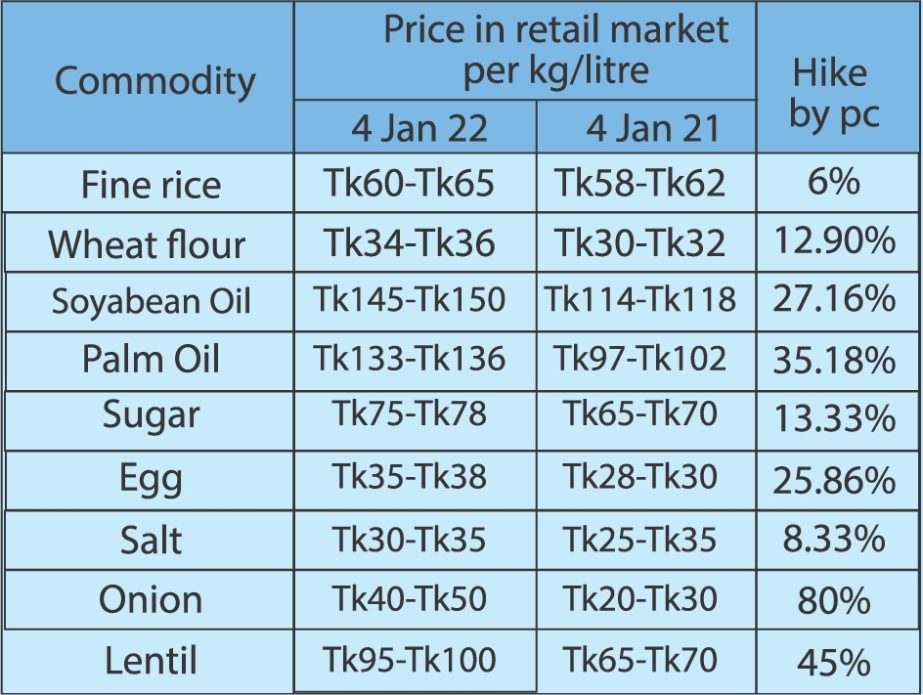
Kazi Zahidul Hasan :
Rising prices of essential commodities have hit the finances of the people who have already been reeling under stress due to a decline in their income as well as savings amidst the Covid-19 pandemic.
Currently, Bangladeshi consumers are paying more for rice, atta, maida, cooking oil, egg, broiler chicken and vegetables as their prices continue to rise during the last one year.
Bangladesh has to depend largely on import of essential commodities and food items to meet the demand of its 160 million population.
“Consumers have to spend more to buy essential commodities as higher shipping and fuel costs are making imports dearer; and at the same time, domestic market prices are going up due to weak government oversight and intervention in the market,” Golam Rahman, President of Consumers Association of Bangladesh (CAB) told The New Nation yesterday.
He said the hike in shipping charges and fuel prices has definitely increased the commodity prices globally, but the way prices of goods and services increased in the local market was just ‘unfair’ and ‘artificial.’
“A syndicate of powerful importers is fixing the prices of goods and commodities on their own in absence of necessary law and rigorous market monitoring,” he added.
Between 4 January 2021 and 4 January 2022, prices of fine rice have increased by 6.67 per cent, coarse rice 2.15 per cent, loose atta 12 per cent, packet atta 25 per cent. loose maida 27.40 per cent, packet maida 25 per cent, loose soybean oil 27 per cent, bottle soyben oil 20.25 per cent palm oil 35 per cent, palm oil super 32.85 per cent, imported lentil 44.44 per cent, local lentil 26 per cent, imported onion 80 per cent, milk power (Dano) 8.13 per cent, sugar 13 per cent, egg 25 per cent and broilerchicken 5.36 per cent, according the data of Trading Corporation of Bangladesh (TCB).
On Friday, fine variety of rice was selling at Tk 60-68 per kg while coarse rice at Tk 45-50 kg, loose atta at Tk 34-36 per kg, packet atta at Tk 40-45 per kg, loose maida at Tk 45-Tk48 per kg , packet maida at Tk 50-Tk55 per kg, sugar Tk 75-80 per kg, salt Tk 30-Tk35 per kg, egg per four Tk 35-Tk 38, imported lentil at Tk 95-Tk 100 per kg while local variety lentil at Tk 105-Tk 110 per kg, loose soybean oil at Tk 145-Tk150 per litre, bottle soybean oil at Tk155-Tk165 per litre, loose palm oil Tk 133-Tk136 per litre while palm oil super Tk 135-Tk140 per litre, local variety of onion at Tk 20-Tk 30 per kg while imported onions was selling at Tk 40-Tk 50 per kg in the capital’s groceries and kitchen markets, according to TCB’s daily market price update.
On 4 January 2021, fine variety of rice was selling at Tk 58-62 per kg while coarse rice at Tk 45-48 per kg, loose atta at Tk 30-32 per kg, packet atta at Tk 33-55 per kg, loose maida at Tk 35-Tk38 per kg , packet maida at Tk 38-Tk 46 per kg, sugar Tk 65-70 per kg, salt Tk 25-Tk35 per kg, egg for per four Tk 28-Tk 30, imported lentil at Tk 65-Tk 70 per kg while local variety lentil at Tk 80-Tk 90 per kg, loose soybean oil at Tk 114-Tk118 per litre, bottle soybean oil at Tk130-Tk135 per litre, loose palm oil Tk 97-Tk102 per litre while palm oil super Tk 102-Tk105 per litre, local variety of onion at Tk 30-Tk 40 per kg while imported onions was selling at Tk 20-Tk 30 per kg in Dhaka’s markets.
Regarding unabated price hike of essential food staple and commodities, Golam Rahman said, “Bangladesh has become a seller’s market. Consumers are forced to pay whatever the sellers charge on goods and services; and the market price varies from one shop to another.”
“Be it rice, wheat flour, sugar pulses, edible oil, the skyrocketing prices of essential commodities has increased monthly expenditures as compared to previous year,” Md Abul Kalam, a private employee, told The New Nation on Friday.
For instance, the current rate of packet wheat flour is Tk 45 per kg now compared to Tk 35 last year. Similarly, the rate of 5 litre bottled soybean oil is now Tk 780 while it was Tk 620 last year. “Such a price hike of essential commodities has made the fixed income group people ‘unnerved,’ he said, adding, “Steps should be taken by the authorities concerned to bring down the prices of the essential commodities in the interest of the common man.”
“There is no policy regarding consumer prices in the country and there was no price monitoring at the source which frees traders to charge anything,” a consumer right activist told the new Nation yesterday on condition of anonymity.
He added, “The government has little interest in consumer prices, and it seems they are on the side of traders, allowing them to cheat consumers.”

